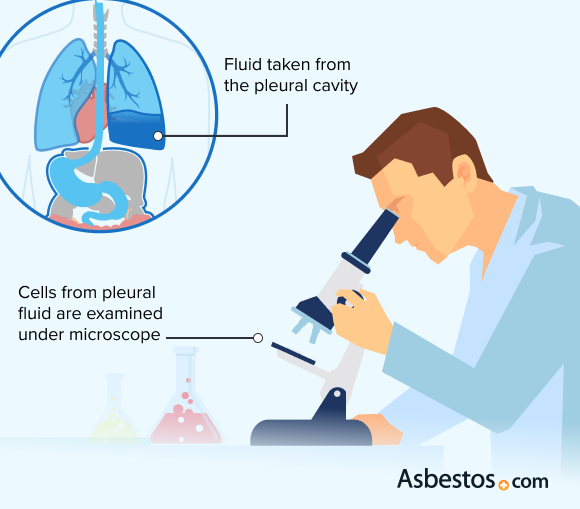After an initial misdiagnosis from multiple doctors, Jim McWhorter and his wife, Pam, then saw his CT scan notes had said, “suspect for mesothelioma.” He was finally able to have a pathologist study his tumor samples and confirm a diagnosis of epithelioid pleural mesothelioma. This allowed him to pursue the best treatment plan for him.
Mesothelioma Pathology
Mesothelioma pathology is the study of a type of cancer related to asbestos exposure. Mesothelioma develops in the tissue lining around the lungs. Doctors use specific details in the pathology report of your tissue samples to determine a diagnosis and develop the right treatment plan for you.
What Is the Role of Mesothelioma Pathology?
Mesothelioma pathology is the study of tissue samples from people with a type of malignant cancer, or cancer with uncontrolled cell growth. When imaging or blood tests suggest someone may have mesothelioma, doctors order a biopsy to collect cells and/or pieces of tumor for a special examination. The experts who perform this examination and testing are called pathologists.
Pathologists examine the sample under a microscope and perform special tests for mesothelioma diagnosis. Doctors then use the pathology results to accurately confirm a diagnosis.
How Pathologists Help Diagnose Mesothelioma
- A tissue specimen is received and the pathologist verifies details such as the patient’s name and the date.
- A visual study called a “gross examination” describes details about the sample’s appearance that can be seen without a microscope.
- The tissue is stained and studied under a microscope for a detailed cell analysis.
- The pathologist writes a report including gross and microscopic observations and a conclusion about the nature of the tissue sample.
Pathology allows doctors and scientists to better understand how mesothelioma develops and spreads. This can lead to better treatment improvements.
Your doctor will use the details from your individual mesothelioma pathology report to determine the right treatment plan for you. This will account for factors such as the particular mesothelioma cells in your sample and how those cells respond to different therapies.
Understanding Your Mesothelioma Pathology Report
Your mesothelioma pathology report describes the results from your sample. For people with mesothelioma, the specimen description section of the pathology report will include details about cell type and markers identified with special staining.
Markers of mesothelioma are antigens, which are proteins immune cells make in response to foreign substances invading the body, signaling that “this cell doesn’t belong here.” Having these details noted in your pathology report helps your doctor confirm your diagnosis.
Elements of Your Pathology Report
- Comments and descriptions: a gross description (how it looks to the naked eye) and a microscopic description of the specimen
- Diagnosis: the overall disease diagnosis based on the pathologist’s examination of your sample
- Pathologist’s information: the name and signature of the pathologist, along with the name and address of the pathology lab
- Procedure details: the case number identifying your individual specimen samples, the date of the procedure used to collect your sample and its type (i.e., blood sample, surgery or biopsy)
- Your information: your name, date of birth, patient ID number (from the doctor’s office), Social Security number and a brief description of your medical history and current clinical diagnosis
The pathologist will send his written report to your doctor. You can request to receive your mesothelioma pathology report from your doctor.
Patient Advocate Danielle DiPietro notes, “When speaking with people about their mesothelioma diagnosis and they don’t know their cell type, for example, I explain that it can be found on their pathology report.” Finding these details in your pathology report can help empower you when speaking with your doctor and making decisions about your treatment plan.
Pathology Tests for Mesothelioma Diagnosis
There are 2 main types of mesothelioma pathology tests: cytopathology and histopathology. Cytology studies cell samples from bodily fluids and secretions. Histology examines body tissue samples.
Cytology for mesothelioma is less invasive, quicker and often a less expensive test. However, it offers more limited information and less conclusive results.
Histology for mesothelioma involves biopsies or samples collected during surgery. While these tests can be more invasive and expensive, they also provide more comprehensive and accurate information.
Cytology

Mesothelioma cytology involves studying blood tests and taking samples of body fluids from the chest cavity. A sterile fine-needle aspiration is a minimally invasive procedure using a thin syringe to collect fluid and a skin-numbing medicine or topical anesthetic. This sterile procedure reduces the risk of infection.
The pleural cavity is the space between 2 layers of the pleura, or lining around the chest cavity. The fluid that cushions that space can contain cancer cells and other markers that suggest cancer is present. The fluid sample from the pleural space is taken from the side or back of your chest cavity to prevent injuring your lung.
Cytology for mesothelioma isn’t enough to diagnose the disease on its own. However, an experienced pathologist’s cytologic evaluation combined with imaging and/or blood testing can help with an initial diagnosis.
Histology for Mesothelioma
A tissue biopsy with histology testing remains the best way to confirm a mesothelioma diagnosis. Staining samples during histology allows pathologists to see markers that can help distinguish mesothelioma from other cancers.
Pathologists also use histology to identify the specific type of cell causing your mesothelioma. There are 3 cell types of mesothelioma: epithelioid, sarcomatoid and biphasic. These are classified based on how a tissue sample looks under the microscope. It’s important to identify which mesothelioma cell type you have because each responds to treatment differently.
“Most of the time, patients aren’t aware of their cell type and have to review their pathology report to find it,” Snehal Smart, M.D., Patient Advocate at The Mesothelioma Center shares. “I review the cell types with them and explain how this also helps the doctor determine the best treatment plan for them.”

Understand your diagnosis, top doctors and ways to afford care.
Get Your Free GuideRole of Mesothelioma Pathology in Treatment Plans
Once the mesothelioma pathology report is completed, the treatment plan begins to take shape. A patient will work with their doctor to choose therapies that can produce the best outcome for them.
“What we know is that the pathology makes a difference in your expectations, from treatment,” Dr. Tirrell Johnson, a medical oncologist at the University of Florida Health Cancer Center-Orlando Health, tells us. A mesothelioma treatment plan may consist of surgery, immunotherapy, chemotherapy, radiation therapy and supportive care.
Epithelioid mesothelioma is mostly treated with combination or multimodal treatment, often including surgery. It tends to respond better to chemo than other cell types do. Sarcomatoid mesothelioma can receive multiple treatment options, but surgery is less common because of this type’s rapid recurrence. Biphasic mesothelioma is a mix of the other 2 types and is treated depending on which cell type is dominant and the location of the diseased tissue.
Next Steps After Receiving Your Pathology Report
Pathology reports will lead to a discussion about your potential treatment options. If you receive the report before discussing it with your doctor, it’s important to go over it and identify any questions you have. This initial review allows you to go into your doctor visit prepared to discuss your results.
What to Do Next
- Consult with your doctor.
- Find a mesothelioma specialist who’ll work with you on a customized treatment plan.
- Make a plan for caregiving and managing your care during treatment.
- Prepare supportive family and friends for the treatment journey to take this on with a positive support circle.
- Contact Patient Advocates for additional help or questions.
Additionally, there are 38 currently ongoing and 60+ recruiting clinical trials in the U.S. as of November 2024 that are looking at advanced research in mesothelioma treatment. Participating in this research can give you an opportunity to try new therapies and assist with extended medical expenses. Talk to your doctor to see if you qualify to be a voluntary participant.
If the conversation about your diagnosis feels overwhelming, know you’re not alone. Your doctor is there to answer questions and support you. Patient Advocates can also offer guidance, support and connections to mesothelioma specialists and cancer centers near you for second opinions and different treatment options.
Common Questions About Mesothelioma Pathology
- Can mesothelioma pathology play a role in improving your prognosis?
-
Mesothelioma pathology, if caught in an early stage, can identify malignant mesothelioma. Early detection of the disease found in body tissue can influence a patient’s prognosis or the best outcome after treatment. The more accurate the pathology results, the better a treatment plan can be created.
- Are there pathologists who specialize in mesothelioma?
-
Yes. If a patient has a known asbestos exposure history, they can talk to their doctor about the importance of finding a pathologist with experience in mesothelioma. There are several across the U.S. who practice this specialty. A Patient Advocate can also work with you to help you find a pathologist with mesothelioma experience.
- Can I get a second opinion on my pathology report?
-
Speak with a Patient Advocate about getting second opinions for pathology and treatment options. They can assist with finding a consultant pathology doctor in your area for more clarity of the pathology report.
- What do I do if I don’t understand my pathology report?
-
Patient Advocates have the knowledge to help guide you through reading your report. They can also suggest questions to ask your doctor or mesothelioma specialist. Understanding your specific pathology report can help allow you to actively be part of developing your treatment plan with your doctor.

![[Question Fixed] (11 & 12) What is pathology and why is it important for mesothelioma patients?](https://www.asbestos.com/wp-content/uploads/f627a8af6557527c4d91b23530e90eb2-768x0-c-default.jpg)




